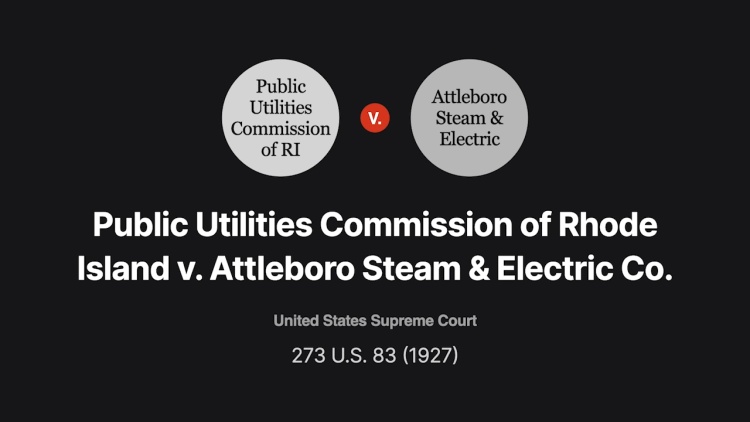Public Utilities Commission of Rhode Island v. Attleboro Steam & Electric Co.
United States Supreme Court
273 U.S. 83 (1927)
- Written by Robert Cane, JD
Facts
In 1917, the Narragansett Electric Lighting Company (Narragansett) and the Attleboro Steam & Electric Company (Attleboro) (plaintiff) entered into a contract for the sale of electricity from Narragansett’s power plant in Rhode Island to Attleboro, which was located in Massachusetts. Narragansett filed a rate schedule and the terms of the contract with the Public Utilities Commission of Rhode Island (the commission) (defendant). The commission approved the special rate for Attleboro. In 1924, Narragansett sought to obtain an increase of the special rate for Attleboro. Narragansett filed a new rate schedule with the commission, which would have canceled the original rate schedule with Attleboro. The commission held a hearing to examine the contract rate and the proposed rate. The commission found that the contract was unreasonable and that continued service at the contract rate would prevent Narragansett from serving fully its other customers, which would be detrimental to public welfare. The commission entered an order instituting the new rate schedule for wholesale-electricity rates. Attleboro appealed the order to the Rhode Island Supreme Court. The Rhode Island Supreme Court held that the order violated the Commerce Clause of the United States Constitution because it was a direct burden on interstate commerce. The commission appealed.
Rule of Law
Issue
Holding and Reasoning (Sanford, J.)
Dissent (Brandeis, J.)
What to do next…
Here's why 907,000 law students have relied on our case briefs:
- Written by law professors and practitioners, not other law students. 47,100 briefs, keyed to 996 casebooks. Top-notch customer support.
- The right amount of information, includes the facts, issues, rule of law, holding and reasoning, and any concurrences and dissents.
- Access in your classes, works on your mobile and tablet. Massive library of related video lessons and high quality multiple-choice questions.
- Easy to use, uniform format for every case brief. Written in plain English, not in legalese. Our briefs summarize and simplify; they don’t just repeat the court’s language.





